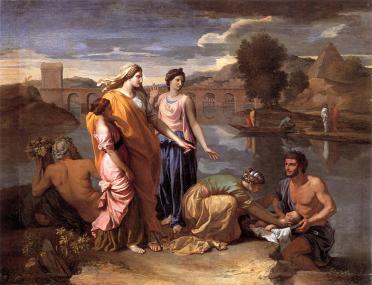Every week, parshaoftheweek.com brings you a rich selection of material on parshat hashavua, the weekly portion traditionally read in synagogues all over the world. Using both classic and contemporary material, we take a look at these portions in a fresh way, relating them to both ancient Jewish concerns as well as cutting-edge modern issues and topics. We also bring you material on the Jewish holidays, as well as insights into life cycle rituals and events...
This week we begin the second book of the Torah, Shemot - Exodus - after completing the Book of Bereshit - Genesis. The Torah tells us how the Jewish people have transitioned from a relatively small family to a nation: in Genesis, we were dealing with Avraham, his children, and his grandchildren. The stories all centered around this small group of people who, by the end of Bereshit, number only seventy, and the interactions they have, which are the kind of things you would expect within a family - sibling rivalry, misbehaving children, and stressed-out spouses. Then, in the first few chapters of Exodus, in Egypt, we are suddenly dealing with a very different situation. The members of this family "were fruitful, and multiplied...very much" , so much so that Pharaoh, apparently nervous about all this Jewish multiplication, calls them, for the first time "the nation of the children of Israel", and, fearing this mass of non-Egyptians in his land, immediately begins to persecute them. The Israelites, however, are undaunted: "And the more they afflicted them the more they multiplied and grew" (Shemot, 1, 12). This famous verse, which is often quoted as a model for the way the Jewish people have not only survived oppression but have actually managed to flourish in spite of it, immediately prompts the question: how? How did they manage to thrive and grow in spite of the Egyptians' best efforts to destroy them?
Ultimately Pharaoh and his people, distressed at their inability to successfully reign in this nation, go to the extreme of genocide, and every male Israelite baby is thrown in the Nile.
Once we get to this murderous climax of oppression, the story suddenly changes focus and reverts to the familial, the personal: "And a man from the tribe of Levi went and took a woman from the tribe of Levi." These, of course, are Moshe's parents. I want to take a look at this narrative shift - the move from a wide lens, encompassing the Egyptian and Israelite nations and their interaction, to the narrow focus on Moshe's family - and see what it might be telling us.
The commentator Rashi tells us an interesting back story behind Moshe's birth: what is described in this verse is actually the re-marriage of Moshe's parents. They were married, had two children, Aharon and Miriam, and then, unwilling to bring a male baby into an Egypt which would have that baby killed, they decided to divorce, rather than risk having a son. At this stage their daughter Miriam challenged them: by seperating, and not bringing any children into the world, "you are worse than Pharaoh! His decree is only against the boys, while you have decreed against the girls as well!" Miriam's plea for a commitment to life even in the face of death convinced them to remarry - hoping, it would seem, for a girl - and as a result Moshe, who, along with his brother and sister, would go on to save the Jewish people, is born.
This story is similar to a number of midrashic statements which tell us how the men of Israel, once enslaved by the Egyptians, were too downtrodden and oppressed by the brutality they lived with to want to have relations with their wives, and to continue to have families. It was only through the efforts of the women, who encouraged them to continue to have those relationships, and have more Jewish children, that the nation, demographically, defeated the plans of the Egyptians to destroy them and "multiplied and grew".
This focus on the family - the marriage of Moshe's parents, his birth - would seem to suggest that the ability of the Jewish people to thrive even when oppressed is not a result of some national spirit, some grand communal plan or program, or a sense of national pride. Rather, when the nation is most threatened, when its very future is in doubt, what the Torah would have us look to for salvation is the basic human interaction of family. It is not on the broad national stage that the Israelites triumph against Egyptian oppression. It is at home, in conversations between children and their parents, husbands and wives, in which commitments are made to life, and love, that they defeated the Egyptian plan to destroy them as a "nation". The nation's strength is precisely there, on the level of the family, of children convincing their parents, of spouses convincing their partners, to love, to not give up on life, to not give up on their family's future. It is there that the Jewish people achieve their destiny.
Shabbat Shalom,
Rabbi Shimon Felix



Get inspired by Shemot Divrei Torah from previous years